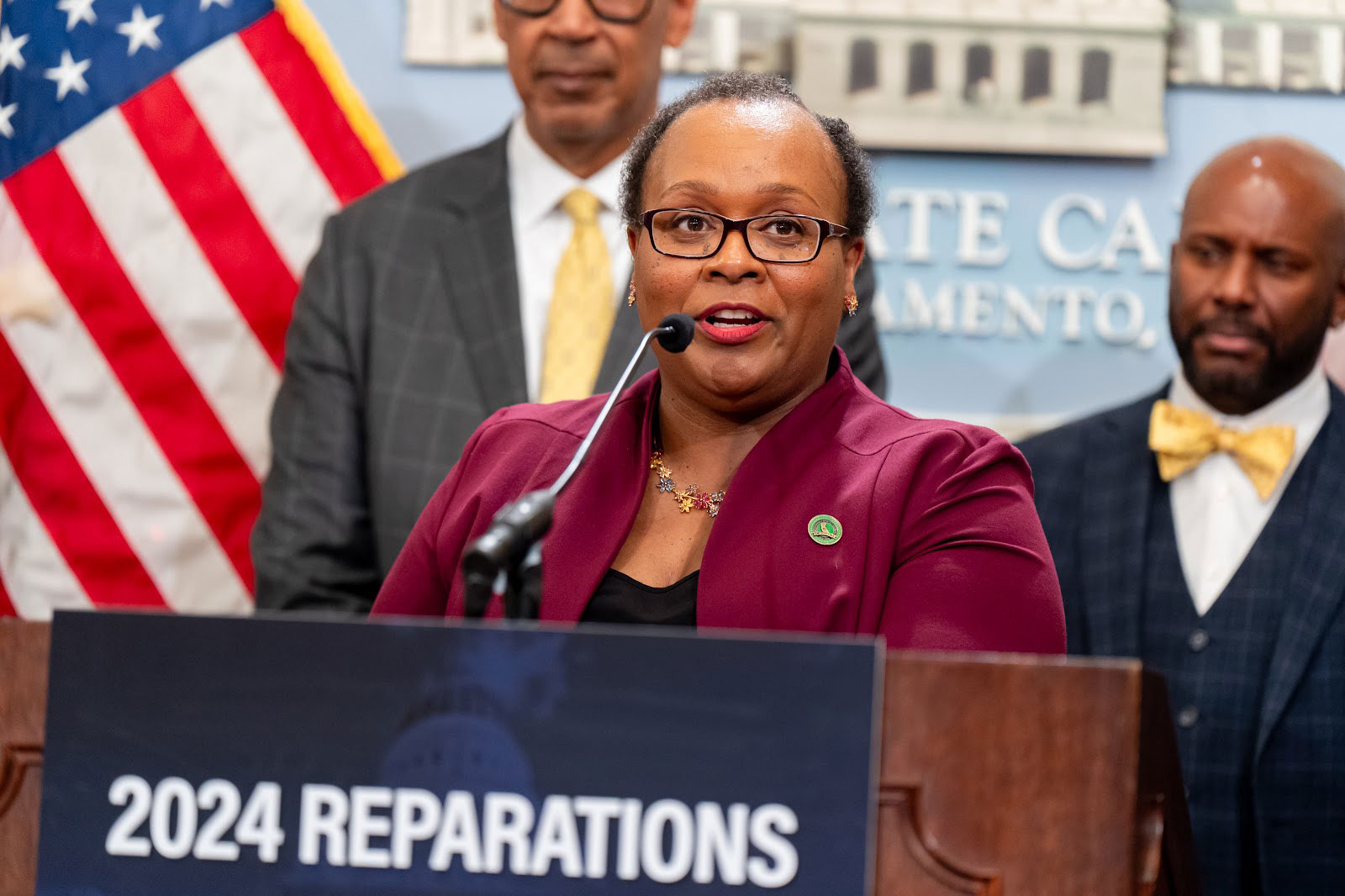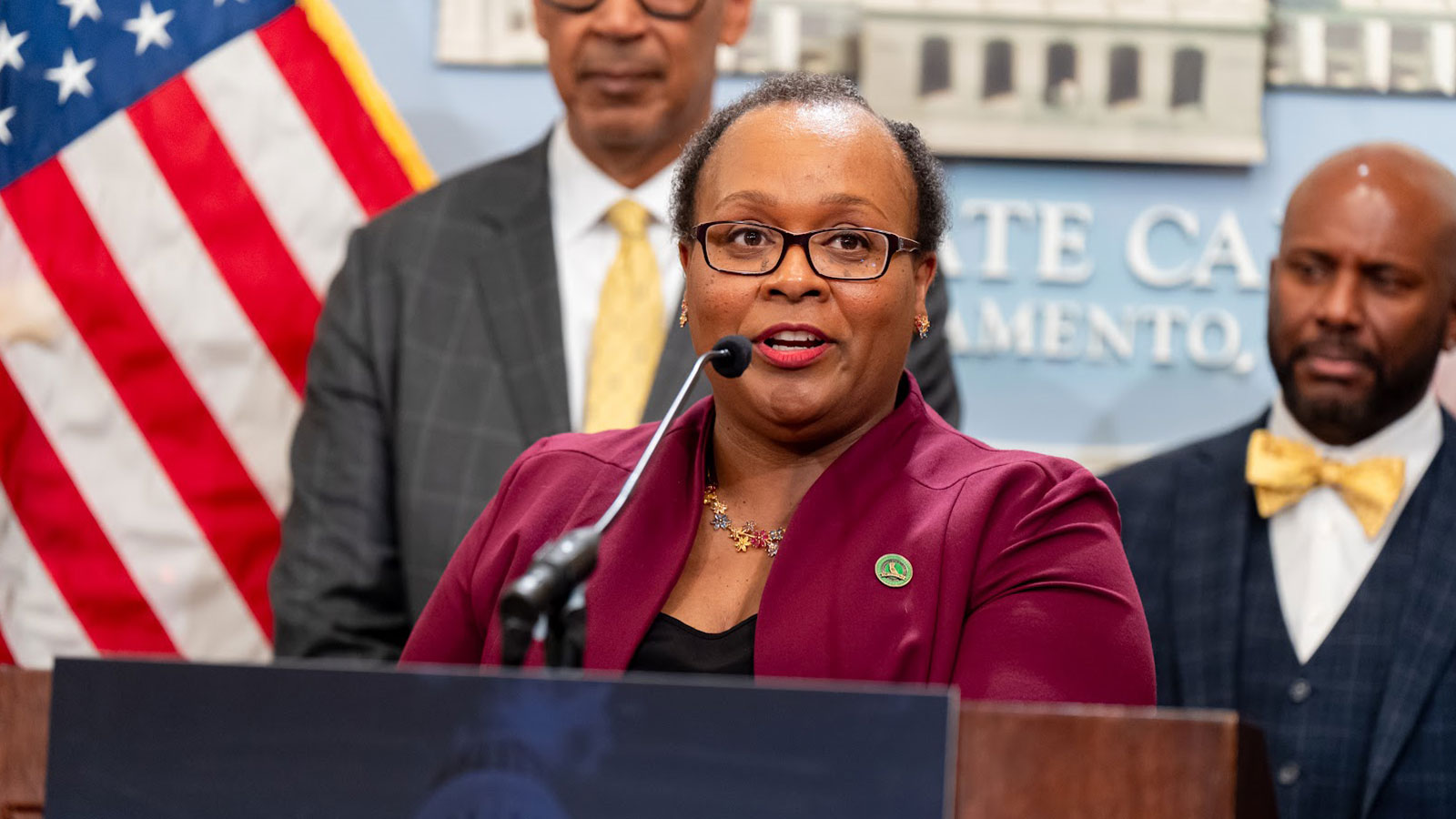Legislators lay out 2024 reparation package, with more in years to come.
By Robert J. Hansen, Observer —
California’s Legislative Black Caucus on Feb. 21 unveiled its 2024 reparations package at the state Capitol, including 14 pieces of legislation covering criminal justice reform, property rights, education, civil rights and food justice.
This is the first of a multiyear reparations initiative, based on the work of the task force to Study and Develop Reparation Proposals for African Americans that was established by law in 2020, to pass several laws that address the harms done to Black Californians by slavery and systemic discrimination.
“Today, 160 years after the abolition of slavery, its badges and incidents remain embedded in the political, legal, health, financial, educational, cultural, environmental, social, and economic systems of the United States of America,” the task force said in its final report to the Legislature last year.

Assemblymember Lori Wilson, chair of the California Legislative Black Caucus, announces the 2024 reparations package of bills Feb. 20 at the Capitol. (Louis Bryant III, OBSERVER)
Assemblymember Lori Wilson, the CLBC chair, said the plan for reparations begins with acknowledgement, apology and action.
“The time is right today, as we stand here relying on the culminating work of the historic reparations task force to bring their report from documentation to implementation,” Wilson said.
The bills and measures are the beginning of an ongoing attempt to implement the recommendations of the task force.
“This is a massive undertaking so you can expect a package of bills year after year,” Wilson said.
Cash payments to descendants of slaves were not in this year’s bill package. Wilson said the Legislature is working within the constraints of its budget. “We will continue to have that discussion as we navigate the next few years,” she said.
Assemblymember Isaac Bryan said cash payments are hundreds of years late already.
“This is going to be a framework of legislation to be continued to put forward until all of the work is done,” Bryan said. “Of course cash transfers has to be part of that conversation.”
Sen. Steven Bradford, who spent two years on the reparations task force, said racially motivated property seizures from African Americans were clearly documented.
One such instance is the eminent domain seizure of Bruce’s Beach, beachfront property taken from Black owners in 1924. It was returned to their descendants last year by the County of Los Angeles.

Assemblymember Reggie Jones-Sawyer discusses his bill, which issues a formal apology for human rights violations and crimes against humanity on African slaves and their descendants, Feb. 20. (Louis Bryant III, OBSERVER)
Bradford said Senate Bill 1050, which he authored, provides a broad pathway to justice for others harmed by the racist policies and practices of the distant and recent past.
“Many African Americans in California and across the nation were denied the opportunity to prosper and build generational wealth as a result of racial bias,” Bradford said.
The CLBC expects all the bills to pass, including Assembly Constitutional Amendment 8, which would remove from the California Constitution the exception clause that allows indentured servitude in state prisons.
ACA 8’s previous version, ACA 3, failed to pass the Senate over claims from the Department of Finance that removing indentured servitude from California prisons would be too costly.
ACA 8 faces the same pushback but, Wilson said, “We will overcome them.”
“Involuntary servitude is a loss of human dignity. Our current incarcerated persons are incurring a loss of dignity,” Wilson said. “When it comes to human dignity, dollars and cents don’t factor in.
“We are working towards a brighter future for every single Californian. Because if you touch the lives of African Americans, you touch the lives of everyone.”
Education
- Assembly Bill 1929 (McKinnor) – Expands access to career technical education by creating a competitive grant program to increase enrollment of descendants in STEM-related Career Technical Programs in high schools and colleges.
- AB to be named (McCarty) – Career education financial aid for redlined communities.
Civil Rights
- ACA 7 (Jackson) – Amends the state constitution to allow the state to fund programs for the purpose of increasing the life expectancy of, improving educational outcomes for, or lifting out of poverty specific groups.
- ACR 135 (Weber) – Formally recognizes and accepts responsibility for all of the harms and atrocities committed by representatives of the state who promoted, facilitated, enforced and permitted the institution of chattel slavery.
- AB 1815 (Weber) – Prohibits discrimination based on natural and protective hairstyles in all competitive sports by extending the CROWN Act to explicitly include competitive sports within California.
- SB 1050 (Bradford) – Property seizures: Restores property taken during race-based uses of eminent domain to its original owners or provide another effective remedy where appropriate, such as restitution or compensation.
- AB 3089 (Jones-Sawyer) – Issues a formal apology for human rights violations and crimes against humanity on African slaves and their descendants.
Criminal Justice Reform
- ACA 8 (Wilson) – Amends the California Constitution to prohibit involuntary servitude for incarcerated persons.
- AB 1986 (Bryan) – Eliminates the corrections department practice of banning books without oversight and review.
- AB 2064 (Jones-Sawyer) – Funds community-driven solutions to decrease community violence at the family, school and neighborhood levels in African American communities by establishing a state-funded grant program.
- AB 280 (Holden) – Mandela Act: Restricts solitary confinement within state-run detention facilities.
Health
- AB 1975 (Bonta) – Make medically supportive food and nutrition interventions, when deemed medically necessary by health care providers, a permanent part of Medi-Cal benefits in California.
- SB to be named (Smallwood-Cuevas) – Addresses food injustice by requiring advance notification to community stakeholders before closures of grocery stores in underserved or at-risk communities.
Business
- AB 2862 (Gipson) – Eliminate barriers to licensure for people with criminal records. Expansion of AB 2138 to prioritize African American applicants seeking occupational licenses, especially those who are descendants.
Source: Observer
Featured image: Assemblymember Lori Wilson, chair of the California Legislative Black Caucus, announces the 2024 reparations package of bills Feb. 20 at the Capitol. Louis Bryant III, OBSERVER Credit: Louis Bryant III















